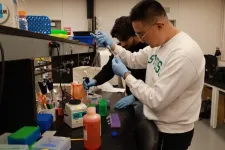(Press-News.org) Chicago (June 29, 2024) — Findings from a new mouse study suggest that elenolic acid, a natural compound found in olives, can lower blood sugar levels and promote weight loss. The research could pave the way to the development of safe and inexpensive natural products for managing obesity and type 2 diabetes in people.
The researchers found that after just one week, obese mice with diabetes that were given oral elenolic acid weighed significantly less and showed better blood sugar (glucose) regulation than before treatment and compared to control obese mice not receiving elenolic acid. The glucose-lowering effect was comparable with that of the injectable diabetic medication liraglutide and better than metformin, one of the most common oral medicines for type 2 diabetes.
“Lifestyle modifications and public health measures have had limited impact on the rising prevalence of obesity, one of the top risk factors for type 2 diabetes,” said research team leader Dongmin Liu, PhD, a professor in the Department of Human Nutrition, Foods and Exercise at Virginia Tech. “Available obesity drugs are ineffective in weight loss maintenance, expensive and/or carry potential long-term safety risks. Our goal was to develop safer, cheaper and more convenient multi-targeting agents that can prevent the occurrence of metabolic disorders and type 2 diabetes.”
Hana Alkhalidy, PhD, a research scientist in Liu’s lab at Virginia Tech, will present the findings at NUTRITION 2024, the flagship annual meeting of the American Society for Nutrition held June 29–July 2 in Chicago.
Liu’s research team focuses on discovering bioactive compounds from natural products for diabetes management. Previously, they looked for specific molecular targets for natural compounds in parts of the body that actively help regulate metabolism, such as the pancreas, muscle, fat tissues and liver. However, since natural products typically have poor bioavailability, they decided to see if they could instead target metabolic hormone secretion in the gut to indirectly regulate metabolic function.
For the new work, the researchers began by identifying natural compounds that act on L-cells, which contain two metabolic hormones released during a meal. These hormones, called GLP-1 and PYY, work together to promote satiety and prevent overeating while also controlling blood sugar levels and metabolism. The screening process revealed that elenolic acid, which is found in mature olives and extra virgin olive oil, can induce the release of these hormones in the gut. They were able to make elenolic acid by breaking down its precursor oleuropein, which is less expensive than extracting it directly from olives.
Tests of the compound in obese mice with diabetes revealed that mice that received oral elenolic acid experienced significant improvements in their metabolic health compared to obese control mice. After four to five weeks of treatment, the mice showed a 10.7% reduction in obesity as well as blood sugar levels and insulin sensitivity that were comparable to those of healthy lean mice.
The elenolic acid also significantly reduced food intake and promoted weight loss, which are associated with improved circulating levels of PYY and GLP-1 and the downregulation of agouti-related peptide in the hypothalamus. Agouti-related peptide is known to increase eating and weight gain when overexpressed.
“Overall, the study showed that elenolic acid from olives has promising effects on hormone release and metabolic health, particularly in obese and diabetic conditions,” said Liu. “The compound seems to mimic the physiological conditions of eating to directly promote gut metabolic hormone secretion, which helps regulate energy balance and metabolic health.”
According to the researchers, the concentration of elenolic acid in olive oil or olives is very low, so the benefits seen in this study would most likely not be gained from olive products alone.
The research team is now working to understand how this compound creates metabolic benefits by analyzing its journey through the body to find out how it is absorbed, distributed, metabolized and excreted. This will also reveal insights into its safety for future clinical trials.
Alkhalidy will present this research at 3:12-3:25 p.m. CDT on Saturday, June 29, during the Bioactives in Health and Disease oral session in McCormick Place (abstract; presentation details).
Please note that abstracts presented at NUTRITION 2024 were evaluated and selected by a committee of experts but have not generally undergone the same peer review process required for publication in a scientific journal. As such, the findings presented should be considered preliminary until a peer-reviewed publication is available.
About NUTRITION 2024
NUTRITION 2024 is the flagship meeting of the American Society for Nutrition and the premier educational event for nutritional professionals around the globe. NUTRITION brings together lab scientists, practicing clinicians, population health researchers, and community intervention investigators to identify solutions to today’s greatest nutrition challenges. Our audience also includes rising leaders in the field – undergraduate, graduate, and medical students. NUTRITION 2024 will be held June 29–July 2, 2024, in Chicago. https://nutrition.org/N24 #Nutrition2024
About the American Society for Nutrition (ASN)
ASN is the preeminent professional organization for nutrition research scientists and clinicians around the world. Founded in 1928, the society brings together the top nutrition researchers, medical practitioners, policy makers and industry leaders to advance our knowledge and application of nutrition. ASN publishes four peer-reviewed journals and provides education and professional development opportunities to advance nutrition research, practice, and education. Since 2018, the American Society of Nutrition has presented NUTRITION, the leading global annual meeting for nutrition professionals. http://www.nutrition.org
Find more news briefs from NUTRITION 2024 at: https://www.eurekalert.org/newsroom/nutrition2024/home.
###
END
Chicago (June 29, 2024) — People with higher intakes of calcium and zinc in the three months before they conceived were significantly less likely to suffer hypertensive disorders during their pregnancy compared with those who had lower intakes of these essential minerals, according to new research.
The results highlight the importance of focusing on nutrition before conceiving — not only during pregnancy — in order to promote healthy pregnancies.
“Our findings underscore the significance of preconception dietary intake of calcium and zinc in potentially reducing the risk of hypertensive disorders of pregnancy,” said ...
About The Study: The results of this survey study indicated that 6 months into unwinding, 1 in 8 Medicaid beneficiaries reported exiting the program, with wide state variation. Roughly half who lost Medicaid coverage became uninsured. Among those moving to new coverage, many experienced coverage gaps. Adults exiting Medicaid reported more challenges accessing care than respondents who remained enrolled.
Corresponding Author: To contact the corresponding author, Adrianna McIntyre, Ph.D., M.P.H., M.P.P., email amcintyre@hsph.harvard.edu.
To access the embargoed study: Visit our For The Media website at this link https://media.jamanetwork.com/
(doi:10.1001/jamahealthforum.2024.2193)
Editor’s ...
Embargoed for release: Saturday, June 29, 2:15 PM ET
Key points:
In a survey of low-income adults across Arkansas, Kentucky, Louisiana, and Texas, one in eight respondents who were enrolled in Medicaid at some point since March 2020—when COVID-19-era coverage protections began—reported no longer having Medicaid coverage by late 2023, months after protections expired and “Medicaid unwinding” began.
Nearly half of those who were disenrolled from Medicaid reported being uninsured in late 2023, and those who lost Medicaid ...
Chicago (June 29, 2024) — A study performed in mice has uncovered a potential new tool to combat the escalating issue of childhood obesity. The research suggests that a simple dietary change, in the form of a fish oil supplement taken by fathers, might help address this pressing health concern.
The number of young people ages 5 to 19 who are obese has risen from 31 million in 1990 to 160 million in 2022, according to the World Health Organization. This extra weight can increase the risk of diabetes, high blood pressure and high cholesterol and may also lead to poor self-esteem ...
New York, NY – June 28, 2024—Kyowa Hakko Bio Co., Ltd. and Kirin Holdings Company, Limited are thrilled to announce their sponsored satellite program at the American Society for Nutrition's (ASN) Annual Conference, NUTRITION 2024. This groundbreaking session will spotlight the neuroprotective effects of citicoline, revealing its potential to enhance cognitive function and combat brain aging.
Attendees will gain an in-depth understanding of how citicoline works at a cellular level, positively impacting brain health. This program will use advanced scientific techniques to examine its effects on neurons, astrocytes, ...
UCSF-led study alerts transwomen and physicians to interpret standard screening guidelines with caution.
Transgender women on hormone therapy tend to skew artificially low on prostate cancer screening tests, which may give false reassurance and delay diagnosis and treatment, reports a new study led by UC San Francisco.
The researchers found that transwomen scored 50 times lower than typical PSA tests (prostate-specific antigen), the gold standard tool to detect prostate cancer. This could mean that current “normal” thresholds are too high for transgender women, and their cancer might not be found until a later ...
The official opening ceremony of FAPESP Week China was held on Friday (June 28) in the city of Dongguan, Guangdong Province. Organized in partnership with the China-Lac Technology Transfer Center (CLTTC), the event brought together political, diplomatic and academic leaders from both countries and also marked the start of the Conference on Technology Exchange and Development of China-Latin America Cooperation.
“On behalf of the Department of International Cooperation of the Ministry of Science and Technology of the People’s Republic of China, I welcome the guests and congratulate the organizers. All friends who share the same mission are not separated by geographical ...
A loss of salt and body fluid can stimulate kidney regeneration and repair in mice, according to a NIH-funded study led by USC Stem Cell scientist Janos Peti-Peterdi and published in The Journal of Clinical Investigation. This innate regenerative response relies on a small population of kidney cells in a region known as the macula densa (MD), which senses salt and exerts control over filtration, hormone secretion, and other key functions of this vital organ.
“Our personal and professional mission is to find a cure for kidney disease, a growing global epidemic affecting one out of seven adults, which translates ...
A team of researchers from Ochsner Health recently published an insightful article in the International Forum of Allergy & Rhinology exploring the application of convolutional neural networks (CNNs) to improve the accuracy and efficiency of nasal endoscopy. The study, authored by resident physician Dr. Vinayak Ganeshan under the guidance of senior otolaryngologist Dr. Edward D. McCoul, addresses the challenges posed by the intricate nasal cavity anatomy in rhinology diagnostics.
Nasal endoscopy (NE) is an essential diagnostic tool in rhinology, but its effectiveness can be hampered by the complex ...
Scientists and kiaʻi loko (fishpond practitioners) have a new tool to aid their efforts to restore and ensure the resilience of Native Hawaiian fishponds. Researchers from the University of Hawai‘i (UH) and fishpond stewards in Hilo, Hawai‘i recently published a study in the Journal of Remote Sensing highlighting the use of uncrewed aerial vehicles (UAVs) to support integrated coastal zone management, including at cultural heritage sites.
“We discovered that drones are effective and cost-efficient ...





